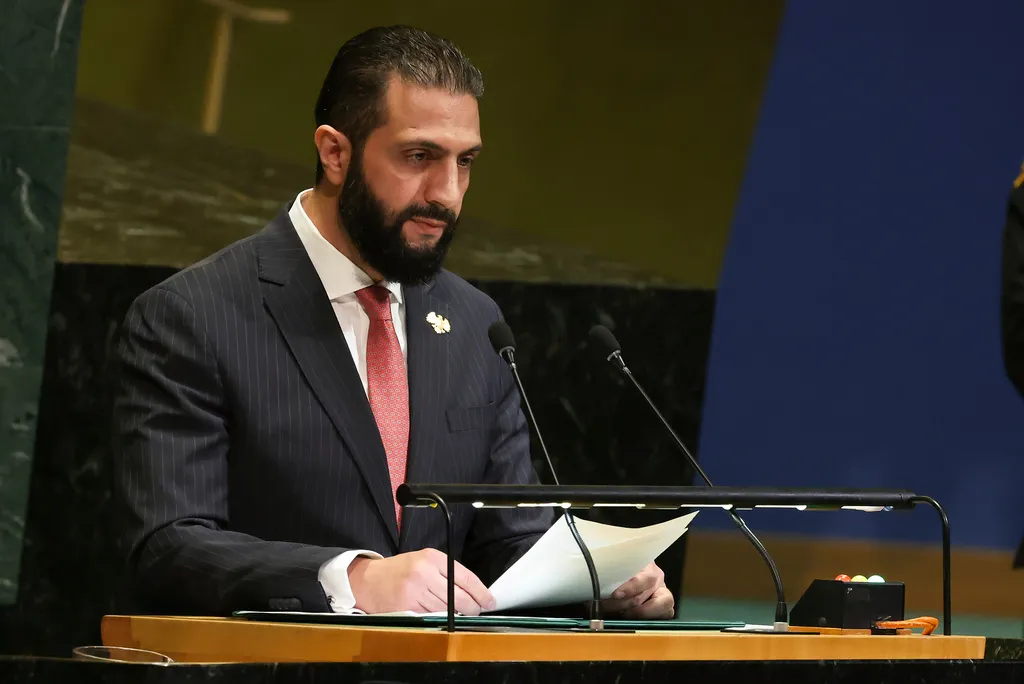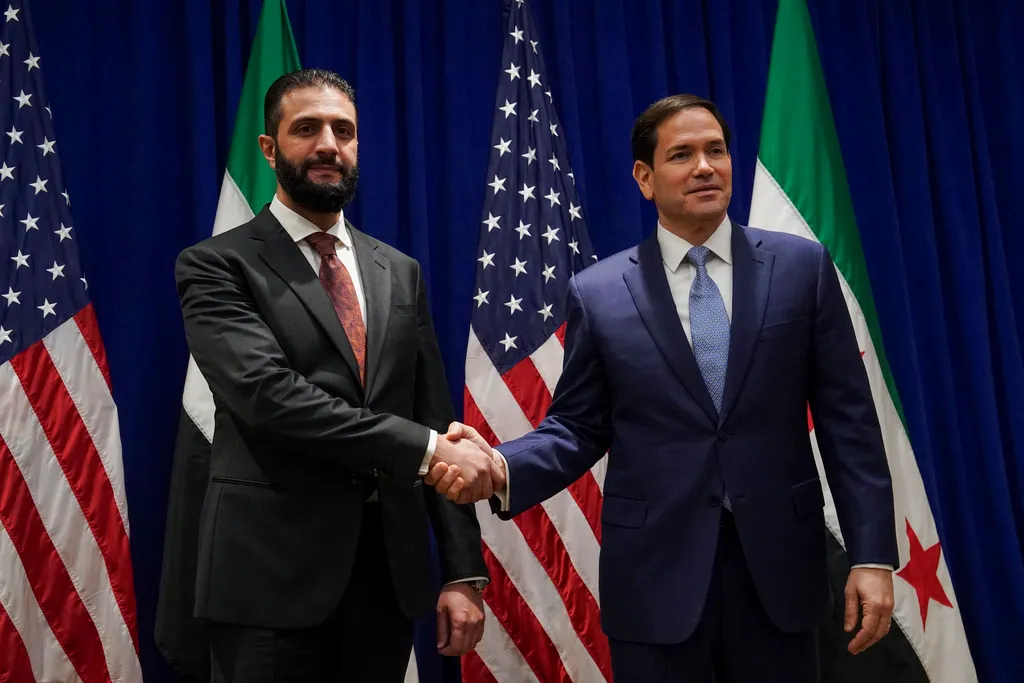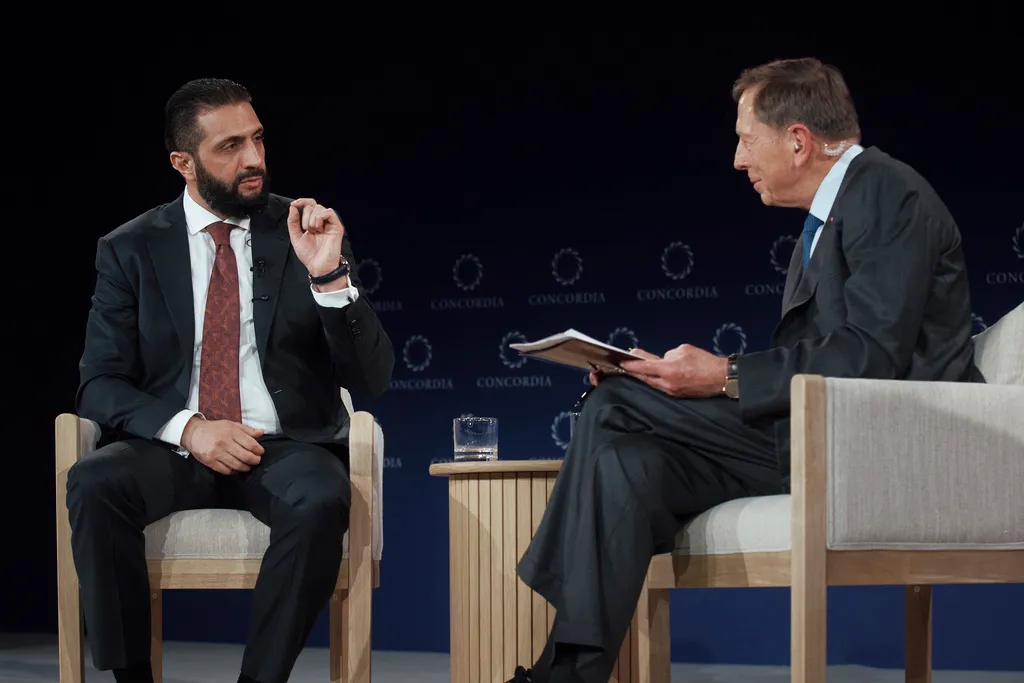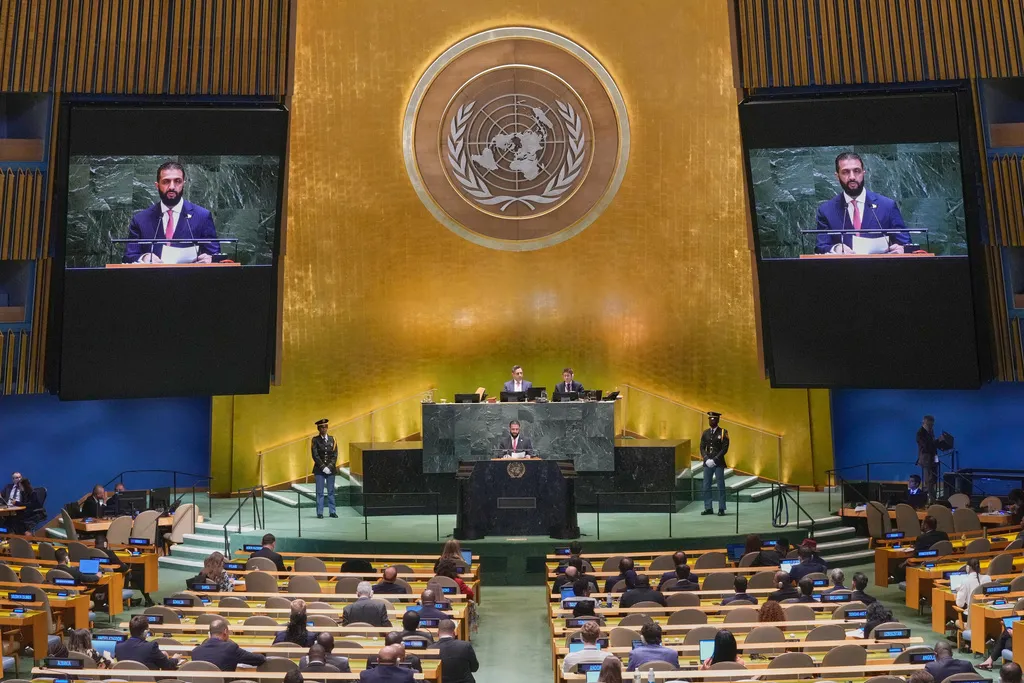


Syrian President Ahmed al Sharaa, a former terrorist insurgent, was the belle of the geopolitical ball less than a year after violently toppling former dictator Bashar Assad.
Al Sharaa addressed the 80th United Nations General Assembly on Wednesday, offering brief remarks that portrayed Syria as a long-oppressed nation seeking to correct injustices of the past domestically and abroad.
Recommended Stories
- London mayor calls Trump 'racist,' 'sexist,' and 'Islamophobic' after president's criticism
- World is 'living through the most destructive arms race': Zelensky
- NewsNation hits record ratings during Charlie Kirk memorial, beating CNN and MSNBC
“Our story is one of the lessons of history, and it is an embodiment of noble human meanings and values in this eternal struggle between good and evil, we find the Syrian story that tells a new chapter of the struggle,” al Sharaa told the gathering of diplomats and world leaders. “One filled with creativity and determination and patience and torture and pain and sacrifice and clinging on to noble customs and values and hard work and relying on God.”

“We restored our right, and we became victorious for the sake of our grievances. We were victorious for the mothers of martyrs, and for all of you, people of the world, for the future of our children and yours, and we paved the way for the return of refugees, and we destroyed the trafficking of drugs,” he said. “Accordingly, Syria has transformed from an exporter of crisis to an opportunity for peace for Syria and the region.”
Al Sharaa is the first Syrian leader to address the general assembly since 1967, when former President Nureddin al Atassi used the occasion to denounce the Arab-Israeli war. Since then, Syrian high officials have declined to attend out of protest against Israeli bias within the body.
Syria’s reemergence on the world stage, complete with technocratic jargon and appeals to human rights, is in service to the larger effort by the new Syrian regime to transform its image from Islamic terrorists affiliated with al Qaeda to clean-cut, suit-wearing statesmen.
That strategy seems to be working with diplomats, high-ranking U.S. leaders, and even former military officers who were once at war with the Syrian leaders’ terrorist movement.
Al Sharaa met on Monday with Secretary of State Marco Rubio on the sidelines of the general assembly in New York.
Rubio and al Sharaa “discussed ongoing counterterrorism efforts, efforts to locate missing Americans, and the importance of Israel-Syria relations in achieving greater regional security,” the State Department said in a statement.

The department added that Rubio “underscored this opportunity for Syria to build a stable and sovereign nation following President Trump’s historic announcement earlier this year on sanctions relief for the Syrian people.”
Al Sharaa’s movement came to power in December 2024 after a blitzkrieg attack that cut through the Syrian military and marched into Damascus, forcing Assad to flee to Russia for protection.
“The previous regime has used the worst kind of torture against our people, the chemical weapons and bombardment and torture in prison, and displacement and sectarian strife and use drugs against our people and the world,” the Syrian leader said in his general assembly speech. ”It has torn our country apart and brought forth fighters from around the world.”
Since the regime change, President Donald Trump has praised al Sharaa as a “young, attractive guy” with a “very strong past.”
The White House has slowly removed sanctions on the Middle East nation in a gesture of openness to reestablishing ties. It additionally lifted the terrorist designation assigned to al Sharaa’s al Nusra Front, also known as Hay’at Tahrir al Sham.
The same day al Sharaa met with Rubio, he sat onstage at the Concordia Summit opposite retired U.S. Army Gen. David Petraeus, who led the U.S. surge into Iraq in 2007.
A surreal exchange emerged between Petraeus and al Sharaa, who was captured by U.S. troops, effectively under Petraeus’s control.
“The fact is, we were on different sides when I was commanding the surge in Iraq. You were, of course, detained by U.S. forces for five years when I was the four-star there,” Petraeus said.

Al Sharaa replied, “It is good that we moved from war to dialogue. Someone who went through war is one who knows best the importance of peace. We cannot judge the past by the rules of today, and we cannot judge today by the rules of the past.”
The Syrian leader explained that his country “needs a new page” and its people “must not be killed by sanctions a second time.”
Petraeus expressed “enormous hope” regarding al Sharaa’s “trajectory from insurgent leader to head of state” as “one of the most dramatic political transformations in recent Middle Eastern history.”
However, reports on the status of human rights inside the new Syrian state do not portray a bastion of peace and democracy.
A series of ethnic blood feuds has emerged in southern Syria, with photos and videos seeming to show state-aligned military personnel participating in violent and demeaning acts against minority groups such as the Druze and the Alawites.
Violence committed against the Druze by Bedouin tribes, with alleged support from Syrian military personnel, led Israel to fire multiple missiles into the country, even striking near the defence ministry and the Presidential Palace in Damascus.
Al Sharaa has moved to expand Druze self-governance and internal security, hoping to quell the conflict and distance the government from any wrongdoing.
“We are scared of Israel, not the other way around,” al Sharaa told a gathering at the Middle East Institute in New York this week. “There are multiple risks with Israel stalling on the negotiations and insisting on violating our airspace and incursions into our territory.”
He continued, “Jordan is under pressure, and any talk of partitioning Syria will hurt Iraq, will hurt Turkiye. That will take us all back to square one.”

Not everyone in the U.S. government is bright-eyed about the future of Syria or the region.
U.S. special envoy to Syria Tom Barrack has expressed extreme pessimism toward U.S. involvement in the Middle East, saying not to trust a single country in the region.
“If we’ve talked about trust, quite honestly, in this business, I don’t trust any of them. Our interests are not aligned. ‘Ally’ is a mistaken word; our interests are not aligned,” he told National News’s On the Record with Hadley Gamble this week.
US ENVOY TOM BARRACK SAYS INTERESTS ‘NOT ALIGNED’ WITH ISRAEL
When asked to clarify whether his feelings included the Syrian regime and even Israel, Barrack said, “Absolutely.”
“When we say ‘peace,’ it’s an illusion,” he said. “There’s never been peace [in the Middle East]. There will probably never be peace because everybody’s fighting for legitimacy.”
